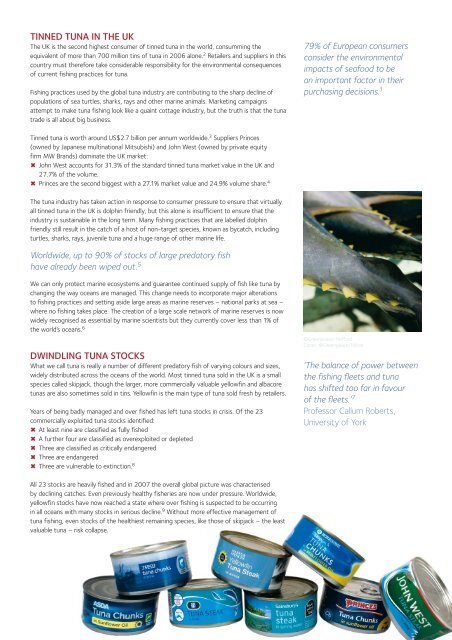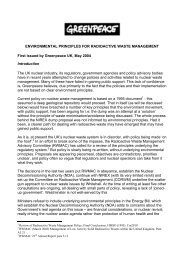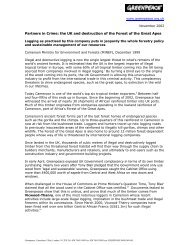TINNED TUNA'S HIDDEN CATCH - Greenpeace UK
TINNED TUNA'S HIDDEN CATCH - Greenpeace UK
TINNED TUNA'S HIDDEN CATCH - Greenpeace UK
You also want an ePaper? Increase the reach of your titles
YUMPU automatically turns print PDFs into web optimized ePapers that Google loves.
<strong>TINNED</strong> TUNA IN THE <strong>UK</strong><br />
The <strong>UK</strong> is the second highest consumer of tinned tuna in the world, consumming the<br />
equivalent of more than 700 million tins of tuna in 2006 alone. 2 Retailers and suppliers in this<br />
country must therefore take considerable responsibility for the environmental consequences<br />
of current fishing practices for tuna.<br />
Fishing practices used by the global tuna industry are contributing to the sharp decline of<br />
populations of sea turtles, sharks, rays and other marine animals. Marketing campaigns<br />
attempt to make tuna fishing look like a quaint cottage industry, but the truth is that the tuna<br />
trade is all about big business.<br />
Tinned tuna is worth around US$2.7 billion per annum worldwide. 3 Suppliers Princes<br />
(owned by Japanese multinational Mitsubishi) and John West (owned by private equity<br />
firm MW Brands) dominate the <strong>UK</strong> market:<br />
x John West accounts for 31.3% of the standard tinned tuna market value in the <strong>UK</strong> and<br />
27.7% of the volume.<br />
x Princes are the second biggest with a 27.1% market value and 24.9% volume share. 4<br />
The tuna industry has taken action in response to consumer pressure to ensure that virtually<br />
all tinned tuna in the <strong>UK</strong> is dolphin friendly, but this alone is insufficient to ensure that the<br />
industry is sustainable in the long term. Many fishing practices that are labelled dolphin<br />
friendly still result in the catch of a host of non-target species, known as bycatch, including<br />
turtles, sharks, rays, juvenile tuna and a huge range of other marine life.<br />
Worldwide, up to 90% of stocks of large predatory fish<br />
have already been wiped out. 5<br />
We can only protect marine ecosystems and guarantee continued supply of fish like tuna by<br />
changing the way oceans are managed. This change needs to incorporate major alterations<br />
to fishing practices and setting aside large areas as marine reserves – national parks at sea –<br />
where no fishing takes place. The creation of a large scale network of marine reserves is now<br />
widely recognised as essential by marine scientists but they currently cover less than 1% of<br />
the world’s oceans. 6<br />
DWINDLING TUNA STOCKS<br />
What we call tuna is really a number of different predatory fish of varying colours and sizes,<br />
widely distributed across the oceans of the world. Most tinned tuna sold in the <strong>UK</strong> is a small<br />
species called skipjack, though the larger, more commercially valuable yellowfin and albacore<br />
tunas are also sometimes sold in tins. Yellowfin is the main type of tuna sold fresh by retailers.<br />
Years of being badly managed and over fished has left tuna stocks in crisis. Of the 23<br />
commercially exploited tuna stocks identified:<br />
x At least nine are classified as fully fished<br />
x A further four are classified as overexploited or depleted<br />
x Three are classified as critically endangered<br />
x Three are endangered<br />
x Three are vulnerable to extinction. 8<br />
All 23 stocks are heavily fished and in 2007 the overall global picture was characterised<br />
by declining catches. Even previously healthy fisheries are now under pressure. Worldwide,<br />
yellowfin stocks have now reached a state where over fishing is suspected to be occurring<br />
in all oceans with many stocks in serious decline. 9 Without more effective management of<br />
tuna fishing, even stocks of the healthiest remaining species, like those of skipjack – the least<br />
valuable tuna – risk collapse.<br />
79% of European consumers<br />
consider the environmental<br />
impacts of seafood to be<br />
an important factor in their<br />
purchasing decisions. 1<br />
©<strong>Greenpeace</strong>/Hofford<br />
Cover: ©<strong>Greenpeace</strong>/Hilton<br />
‘The balance of power between<br />
the fishing fleets and tuna<br />
has shifted too far in favour<br />
of the fleets.’ 7<br />
Professor Callum Roberts,<br />
University of York




![[2007] EWHC 311 - Greenpeace UK](https://img.yumpu.com/22079793/1/184x260/2007-ewhc-311-greenpeace-uk.jpg?quality=85)












